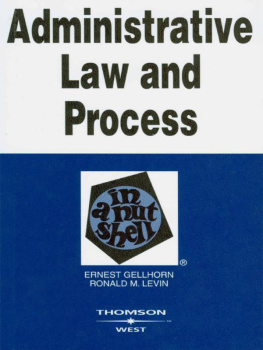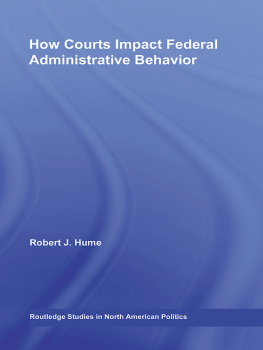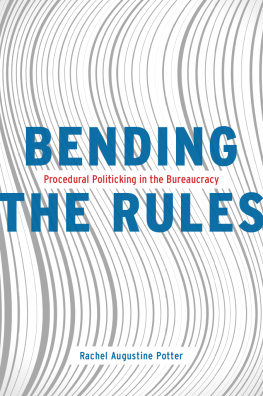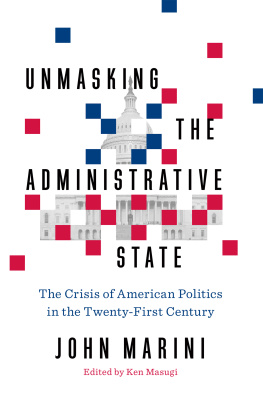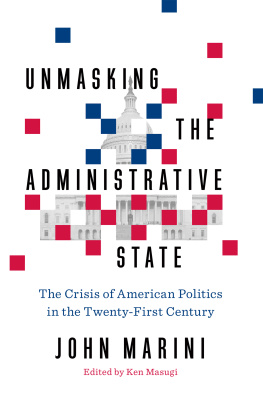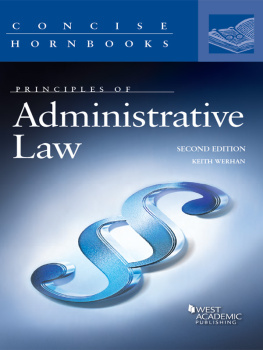Landmarks
Page list

WESTS LAW SCHOOL
ADVISORY BOARD
__________
JESSE H. CHOPER
Professor of Law,
University of California, Berkeley
DAVID P. CURRIE
Professor of Law, University of Chicago
YALE KAMISAR
Professor of Law, University of San Diego
Professor of Law, University of Michigan
MARY KAY KANE
Chancellor, Dean and Distinguished Professor of Law,
University of California,
Hastings College of the Law
LARRY D. KRAMER
Dean and Professor of Law, Stanford Law School
WAYNE R. LaFAVE
Professor of Law, University of Illinois
JONATHAN R. MACEY
Professor of Law, Yale Law School
ARTHUR R. MILLER
Professor of Law, Harvard University
GRANT S. NELSON
Professor of Law, University of California, Los Angeles
JAMES J. WHITE
Professor of Law, University of Michigan
I
ADMINISTRATIVE LAW AND PROCESS
IN A NUTSHELL
Fifth Edition
By
ERNEST GELLHORN
Late Foundation Professor of Law
George Mason University
RONALD M. LEVIN
Henry Hitchcock Professor of Law
Washington University in St. Louis

Mat #40111872
II
Thomson/West have created this publication to provide you with accurate and authoritative information concerning the subject matter covered. However, this publication was not necessarily prepared by persons licensed to practice law in a particular jurisdiction. Thomson/West are not engaged in rendering legal or other professional advice, and this publication is not a substitute for the advice of an attorney. If you require legal or other expert advice, you should seek the services of a competent attorney or other professional.
Nutshell Series, In a Nutshell , the Nutshell Logo and West Group are trademarks registered in the U.S. Patent and Trademark Office.
COPYRIGHT 1972, 1981, 1990 WEST PUBLISHING CO.
COPYRIGHT 1997 By WEST GROUP
2006 Thomson/West
610 Opperman Drive
P.O. Box 64526
St. Paul, MN 551640526
18003289352
Printed in the United States of America
ISBN13: 9780314144362
ISBN10: 0314144366

III
PREFACE
__________
Ernest Gellhorn, the author of the first edition of Administrative Law and Process in a Nutshell and co-author of all subsequent editions, passed away in May 2005. At that time, half of the chapters in the book had been revised for this edition, and Ernie had approved their contents after contributing his suggestions. All of the chapters, however, contain ideas, explanations, and turns of phrase that originated with him. His insights into administrative law, his worldly perspective, and his habitual clarity of expression will, therefore, animate these pages for years to come.
Ernie commanded broad respect as a professor, law school dean three times over, managing partner of a major law office, and leader in the administrative law bar. His familiarity with the worlds of both scholarship and practice enriched his writing and caused his views to be widely sought out. And his independence of mind, generosity, and good humor made him a delightful co-author. It was a privilege to work with him, and this edition is respectfully dedicated to his memory.
R.M.L.
*
LI
ADMINISTRATIVE LAW AND PROCESS
IN A NUTSHELL
Fifth Edition
*
V
OUTLINE
__________
VI
VII
VIII
IX
*
INTRODUCTION
Administrative agencies usually are created to deal with current crises or to redress serious social problems. Throughout the modern era of administrative regulation, which began in the late nineteenth century, the governments response to a public demand for action has often been to establish a new agency, or to grant new powers to an existing bureaucracy. Near the turn of the century, agencies like the Interstate Commerce Commission and the Federal Trade Commission were created in an attempt to control the anticompetitive conduct of monopolies and powerful corporations. The economic depression of the 1930s was followed by a proliferation of agencies during the New Deal which were designed to stabilize the economy, temper the excesses of unregulated markets, and provide some financial security for individuals. Agencies were also established or enlarged in wartime to mobilize manpower and production, and to administer price controls and rationing. The development of new technologies, ranging from radio broadcasting to air transportation to nuclear energy, often led to creation of new government bureaus to promote and supervise these emerging industries. In the 1960s, when the injustices of poverty and racial discrimination became an urgent national concern, the development of programs designed to redress these grievances expanded the scope of government administration. More recently, increased public concern about risks to human health and safety and threats to the natural environment have resulted in new agencies and new regulatory programs.
The primary reason why administrative agencies have so frequently been called upon to deal with such diverse social problems is the great flexibility of the regulatory process. In comparison to courts or legislatures or elected executive officials, administrative agencies have several institutional strengths that equip them to deal with complex problems. Perhaps the most important of these strengths is specialized staffing: an agency is authorized to hire people with whatever mix of talents, skills and experience it needs to get the job done. Moreover, because the agency has responsibility for a limited area of public policy, it can develop the expertise that comes from continued exposure to a problem area. An agencys regulatory techniques and decisionmaking procedures can also be tailored to meet the problem at hand. Agencies can control entry into a field by requiring a license to undertake specified activities; they can set standards, adjudicate violations, and impose penalties; they can dispense grants, subsidies or other incentives; they can set maximum or minimum rates; and they can influence conduct through a wide variety of informal methods.
However, these potential strengths of the administrative process can also be viewed as a threat to other important values. Administrative flexibility may simply be a mask for unchecked power, and in our society unrestrained government power has traditionally been viewed with great and justifiable suspicion. Thus, the fundamental policy problem of the administrative process is how to design a system of checks which will minimize the risks of bureaucratic arbitrariness and overreaching, while preserving for the agencies the flexibility they need to act effectively. Administrative law concerns the legal checks that are used to control and limit the powers of government agencies.
Moreover, continued exposure to the same issues may lead not only to agency expertise but also to rigidity and ineffectiveness. Indeed, scholars and other critics have identified a wide variety of causes for regulatory failure: the basic theory of the regulatory program may be wrong, or the state of knowledge not adequate to support wise decisions; there may be a mismatch between the regulatory objective and the technique chosen to achieve it; the agency may be unduly influenced or captured by a powerful constituency group; agency officials may be incompetent or corrupt or lack incentives to produce quality work; and regulatory programs may simply be politically unacceptable in a particular time and place.

